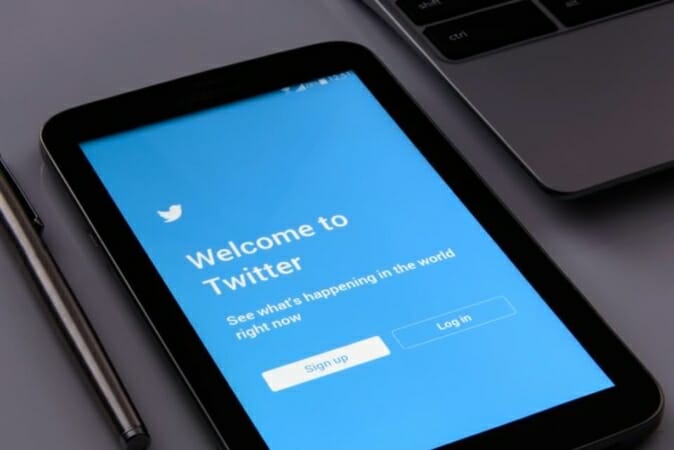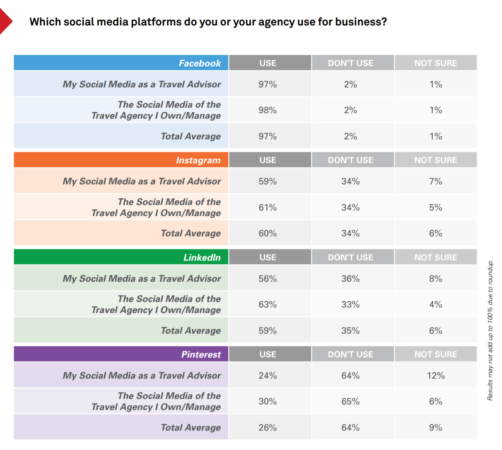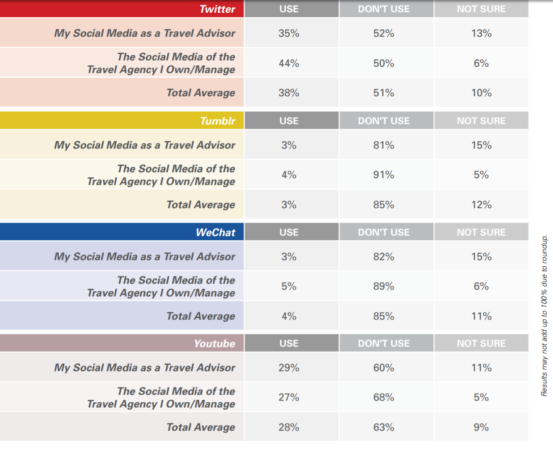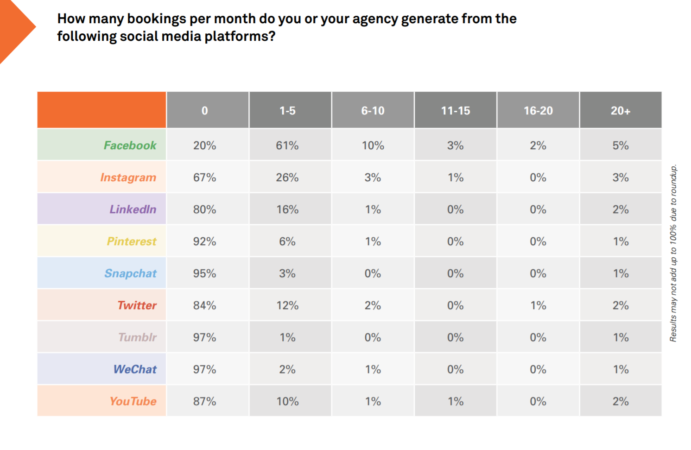Deep Dive: The Travel Industry's Social Media Marketing Landscape
This deep dive takes a closer look at the social media marketing trends shaping today's travel industry. How are travel agents using social media to connect with customers? Which social media sites are the most powerful? And most important of all, which techniques are working?
This analysis is based on Travel Market Report’s recent Outlook on Social Media. We've trawled through it and cut it down to the best bits so you don't have to.
We hope you find it useful, insightful and packed with takeaways that you can start applying in 2019 and beyond. Enjoy!
Social Media: The Ultimate Equaliser?
When discussing our marketplace software, one theme that constantly comes up is that of competing with the major players. For any agency or tour provider setting up in the travel industry, it's an uphill battle to even get noticed online. That's why our proven solution brings smaller providers together in a way that amplifies their reach and evens out the playing field.
But social media works in a different way to search engine rankings. On the one hand, huge industry names are more likely to draw a following and, of course, have bigger budgets to push into direct marketing and content production. But on the other hand, the social media landscape is more egalitarian that search engine rankings.
That's because it's a total equaliser. Everyone starts from nothing and even small travel agencies and tour operators can gain a large, loyal following. So long as they use the platforms correctly.
Doing things right is the Holy Grail here. So what can Travel Market Report’s Outlook on Social Media tell us about how travel agencies can position themselves, how brands can rise and fall through social media, and what kind of interactions lead to successful conversations and conversions?
The Importance of Having a Social Media Plan
The rise of Social Media has led to an interesting challenge for all small businesses, not just travel agencies. How do you strike the right balance between building an audience, projecting your philosophy and being goal oriented: driving traffic to your website, selling, that kind of thing?
This balancing act, on top of uncertainty around using Social Media and its tangible benefits, has led to a weird phenomenon around its use for business purposes. For example, the Outlook on Social Media report found that 43% of respondents have a formal social media plan versus 41% who don’t and 16% who weren’t sure.
You read that right: Less than half of the travel agencies surveyed have a formal plan in place for Social Media management.
However, of those agents who said they had generated ,000 or more in sales from their Social Media efforts, 59% said they had a social media marketing plan.
So what conclusion can we draw from these findings? Well, for starters, they suggest that having a plan is linked to increased sales through social media channels. But we can't say why for sure. It might be that having a plan means that posts are more consistent, more cleverly targeted and more thought through.
Or, it could be that travel businesses that approach Social Media with rigour and thoroughness apply those same attributes with great effect to the rest of their operations.
The question of whether or not to adopt a formal Social Media plan gets right to the heart of our uncertainty about using these platforms. Facebook, Twitter, Instagram and the like have been designed to amplify spontaneity. The last thing many travel agents want to do is come across as contrived (and boring). So perhaps that fear is holding many travel operators from seeing the full potential of Social Media marketing.
Is your travel agency one the many posting inconsistently, without a formal plan, and unsure over what the aims and aspirations are?
Here are three quick tips to get you moving in the right direction...
- Know your intended audience and post with a purpose. In other words, get yourself a plan, or at least an idea of who you want to target and the kind of content they are going to find inspirational.
- Don’t get caught up in the rush to gain followers. On platforms like Facebook and Instagram, your ultimate goal is always going to be conversions. More followers doesn't necessarily mean more conversions. What's arguably more important is engagement. Buying followers or encouraging follower growth through other devious means is self-defeating and not a good way to start.
- Keep learning. The social media landscape is constantly changing, so you have to adapt and keep up. So do that however you can: attend webinars, read articles just like this one, continue your own research. Whatever it takes to improve your knowledge of the landscape.
SEO Counts for Social Media, Too
You might think that SEO - Search Engine Optimisation - is strictly related to the content of your website. But Social Media platforms are part of the internet too, so there are techniques you can apply across the board.
The algorithms that determine the content on Social Media platforms are also similar to those that govern Google search results. For example, users on Instagram often rely on keywords to find the content they like and are interested in. Plus, the amount of engagement a post gets will dictate how widely it gets pushed.

There is a quite staggering admission from respondents in the Outlook On Social Media survey: 40% didn’t know what SEO is and only 23% apply it to Social Media operations.
A related contention was that nearly 60% of respondents don’t use or track hash tags or weren’t sure. As the primary way that people discover content they are interested in on platforms such as Twitter and Instagram, that is pretty unforgivable from a large number of travel agencies.
55% of respondents who said they had sold at least ,000 via their social media efforts do use hash tags. #TheProofIsInThePudding.
Social Media Analytics: Testing Your Methods
The running theme here is that travel agents and advisors are perhaps not taking the potential of Social Media marketing seriously enough.
That is borne out in our next statistic. Just over half (51%) of agencies use the analytics provided by social media to gather information about their target audience. And only 37% of travel advisors use analytics to gauge the effectiveness of their own social media efforts.
Social Media is crowded and competitive space, so keeping tabs on your methods and results is the only way you're going to improve. Best of all, every platform provides insights and metrics into the performance of your posts, so there's no excuse not to test and track your results.
What Type Of Social Media Posts Appeal to Travellers?
We've written at length in the past about Social Media tips for professionals working in the travel industry. We've also discussed the power of an effective video strategy and the impact of video content from a content marketing perspective.
There are few industries as reliant on visuals than travel. Beautiful, aspirational photos and videos are often what it takes to push travellers toward a particular destination and make a sale happen. They are the means through which a compelling story is told.
The proof is there for all to see. Posts on platforms like Twitter and Facebook tend to receive more engagement if images or videos are included. While videos on landing pages can increase conversions by up to 80%.
More than two-thirds of agents (68%) who responded to the survey said they use video in their social media.
Significantly, around 79% of those respondents who said they had sold at least ,000 worth of travel via social media in the past year said they use video.
So what about the general theme of posts? What have travel industry professionals found to be the most effective? As you'd expect, at the top of the list are the most visual posts: Photography from the travel of agents themselves (65%) and beautiful travel photography (63%).
But then there are more conventional marketing tools: 62% of agents found special offers to be an effective form of content.
Interestingly, it appears as though travellers aren't so keen on hearing about practical things or negatives. Only 28% of agents found it effective to post travel alerts about weather or other disruptions.
Social Media Objectives & Lead Generation
A running theme through Travel Market Report's research is that many industry professionals aren't exactly sure what they are doing on Social Media, what their aims are and how to measure success.
It would appear as though we are in an experimental phase at the moment.

Social Media interactions are having an influence on sales, no doubt. At least 11% of travel advisors and
agencies said they have been able to generate at least 0,000 in sales through Social Media efforts.
33% of advisors claimed that using the platforms available had resulted in at least ,000 in sales over the past 12 months. But there's an interesting difference here with agencies, of which just 25% achieved similar results. This could be because the role of travel advisor is relatively new compared with an agency, and that the advisor service is more relatable and easy to target towards Social Media-savvy travellers.
Again though, we see that a minority of travel industry professionals are approaching things in a coordinated manner. Tracking sales wasn’t universal. 38% of advisors and 29% of agencies said they “don’t or can’t track sales.”
One agent offered an explanation for this: “It is difficult to draw straight lines from client interaction and a sale. Social media is part of an overall strategy of engagement.”
The discrepancy between there being money to be made via Social Media and a lack of professionals actually tracking sales can be partly explained by our next statistic. When asked about their Social Media objectives, this is what respondents had to say.
As you might expect, gaining new customers was the number one reason that advisors (87%) and agencies (86%) use Social Media. But for agencies, it's also about 'building awareness and positioning expertise' (82%).
Marketing to existing customers (77%) took the second spot for advisors. In total, around 50% of respondents use Social Media as an advertising platform with specific objectives in mind.
All of which suggests there is are myriad reasons to be active on Social Media if you are trying to sell travel. The breadth of those reasons may explain the lack of focus towards either one in particular. Not to mention the fact that these platforms offer a place where you can do all of those things and more simultaneously.
Read more: How To Boost SEO and Build Links For Your Travel Startup
Which Platforms Are Proving Popular?
One major question that travel professionals have when considering Social Media marketing is: Which channels/platforms are best?
With limited resources and several platforms to choose from, it's important to focus efforts in the right place.
Here are the results indicating the most popular Social Media platforms for travel agencies and advisors.


So what are the headlines? Well, despite what we know about the power of visuals in marketing travel, Instagram sits in second place behind the mighty Facebook.
But the gap between Facebook and the rest is stark. Almost every travel agent or advisor has a Facebook presence. That may say more about Facebook's dominance than anything else. But it perhaps misses the fact that millennials are abandoning Facebook by the million and switching onto other networks.
This generation is, as we have discussed before, hugely into travel and has growing buying power. And that's before we mention the coming tsunami that is generation Z.
So let's take a closer look at the stats. Facebook is by far the dominant social media platform when it comes to the travel agency community. 97% of respondents confirmed that they use it for their business.
Instagram (60%) and LinkedIn (59%) came in second and third respectively. Twitter was used by 38% of respondents followed by YouTube at 28% and Pinterest at 26%.
Again here we see that the travel industry as a whole is neglecting the opportunity to tap into Social Media networks most frequented by younger travellers. That YouTube is the focus of efforts for just 28% of the industry is a big surprise, particularly given its size as a platform and its emphasis on inspirational video content.
The compelling nature of visuals comes to the fore with a stat released by Travel Market Report's: Agents that said they had sold at least ,000 via social media in the past year were statistically more likely to use Instagram (72%) than the overall population.
How Are Travel Companies Using Paid Advertising on Social Media?
With so much uncertainty around the use and effectiveness of Social Media to sell travel, it's not surprising that the percentage of travel companies not running paid adverts is significant: Around half don't run any kind of paid campaigns.
Travel advisors are less likely to engage in paid advertising on Social Media than agencies, but for those that do, Facebook dominates again. 61% of agencies that run paid ads do so on Facebook. 44% of advisors do the same.
Despite being the go-to platform for millennials and dedicated to visuals, Instagram was used on a paid basis by 10% of advisors and agencies. 5% of both groups said they used paid adverts on LinkedIn, perhaps due to having a focus on business-related travel. It's also where professionals with money to burn tend to congregate.
Only 3% of advisors and 1% of agencies used paid advertising on YouTube. Is that the definition of untapped potential?
Final Thoughts
There were some really interesting statistics in there. More travel professionals than we expected couldn't tell you what a hash tag is. Few utilise SEO tactics in their Social Media campaigns. Facebook is dominating the efforts of many despite it being left behind by the younger generation.
There's also an obvious shortage of travel agents and advisors who go into Social Media with a plan in mind or any intention to track lead generation and progress. Without those key foundations, it's difficult to make progress and adjust your methods to improve results.
It's also difficult to build consistency unless you have a structure in place. And that's key to growing any type of community following.
But plenty are ahead of the curve and doing things right. Below are the bookings per month made, on average, by agencies and advisors through Social Media platforms.
You can expect these figures to rise in the coming years as travel industry professionals get to grips with how best to harness the power of Social Media.
